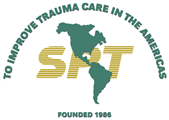

PANAMERICAN TRAUMA SOCIETY
SOCIEDAD PANAMERICANA de TRAUMA
Surgical Skills in Trauma (DQT)

The Surgical Skills in Trauma (SST) Course is a training opportunity aimed at trauma surgeons, general and pediatric surgeons, general practitioners, and medical students in recent years. It consists of two phases (Theoretical and Practical) designed to provide comprehensive and practical learning, taught in partnership with Edu Trauma.
The first theoretical phase is carried out completely remotely. It includes 20 hours of classes, three live meetings (one per week) for the discussion of clinical cases, delivery of study articles, knowledge tests every two modules, and a thorough final evaluation.
The second phase, practice, is divided into three essential stages. Discussion of clinical cases, practice in bench surgery (with biological material and high-fidelity simulators) and practice in experimental surgery in live animals. This hands-on phase gives participants the opportunity to apply the knowledge gained in a real-world environment.
Both phases of the course award a certification endorsed by the Pan American Trauma Society. To obtain the certificate, participants must pass all modules and the final exam. This course represents an invaluable opportunity to improve surgical skills and the management of trauma situations, thus contributing to the improvement of medical care in critical cases.
Description of the theoretical and practical phase.
Theoretical Phase: 20 hours, completely distance distributed in 6 modules, over 27 days.
Video classes: This phase comprises a series of video classes taught by experts in the field of trauma and surgery. Participants will receive extensive training on the fundamental principles of surgical management in trauma situations, including initial assessment, patient stabilization, advanced surgical techniques, and complication management. Classes will address topics such as the management of traumatic wounds, complex fractures, visceral injuries, and damage control procedures, among others.
Live Meetings: Live discussions of clinical cases (3 sessions) are organized. Real clinical cases will be presented for discussion and analysis. Participants will have the opportunity to apply the knowledge acquired in the theoretical classes to practical clinical situations. These live discussions will encourage the exchange of experiences and joint problem-solving.
In the same way, in these synchronous meetings, some questions that were formulated in the continuous evaluations of the modules are discussed.
Delivery of Study Articles: Relevant scientific articles and case studies will be provided to complement the theoretical training. These materials will serve as additional resources to broaden the understanding of the topics covered in the classes.
Direct communication with instructors: The platform offers the possibility of making comments and/or doubts in relation to the classes delivered, these are answered by the instructors, and can be discussed with all the students who are in the course, this in order to further reinforce learning.
Knowledge Test: After each module, participants will complete knowledge tests to assess their understanding of the topics taught. These tests will provide immediate feedback and help identify areas that require further attention.
Final Evaluation: At the end of the theoretical phase, a comprehensive final evaluation will be carried out to assess the participants' mastery of the concepts and skills acquired during the course. This assessment will be a prerequisite to advance to the practical phase of the course and must be passed with a minimum of 80 points.
Practical Phase: 20 face-to-face hours, distributed in III stages, for 1 day and a half.
Clinical Case Discussion (5-6 hours): In this stage, participants will work in groups to analyze and discuss complex clinical cases related to trauma. They will focus on developing comprehensive management plans and surgical strategies appropriate to each specific case.
Bench Surgery (6 hours): Participants will have the opportunity to practice surgical techniques with biological material and high-fidelity simulators. This session on the surgical bench will allow participants to become familiar with surgical instruments, improve manual dexterity, and practice specific trauma-related procedures.
Experimental Operating Room (7 hours): In this final phase, participants will have the opportunity to apply their skills in a real surgical environment. Under the supervision of experienced surgeons, they will participate in live trauma-related surgical procedures. This hands-on experience in the operating room will provide an invaluable hands-on learning opportunity and consolidate the knowledge gained during the course, the instructor-student ratio is 1:3.
Final Assessment: The practical phase will conclude with a final assessment that will assess participants' ability to effectively apply the concepts and skills acquired in a real clinical setting.
Fraternity and Integration Activity: As an integral part of the Surgical Skills in Trauma (DQT) Course, a special fraternity and integration activity is organized among students during the practical phase of the course. This activity aims to strengthen the bonds between participants, promote teamwork, and create an atmosphere of camaraderie.
This comprehensive structure of the DQT course is designed to provide participants with a comprehensive and hands-on training in surgical trauma management, preparing them to confidently face the challenges in this critical field of medicine.
Value: Registrations are made directly at Edutrauma.net
- Theoretical Phase: 500 USD
- Practical Phase: Varies by country, please validate directly in edutrauma.net
Note: Each phase of the course has different values. The scheduling of the Practical Phase depends on local regulations, installed capacity, and the number of students per country. To register and take phase 2, it is mandatory to have completed phase 1.
Course Director: Dr. Pablo Ottolino
Faculty: Aurelio Rodríguez, Luis Richard, Carlos Yánez, Gustavo Machain, Guillermo Barillaro, Napoleón Méndez, Esteban Foianini, Manuel Lorenzo, Juan Pablo Ramos, Analia Zinco, Claudia Arenas, Jesús Lugo, Willy Neumann, Marcelo Riveiro, Fiorella Hinojosa, Cinthia Gozalez, Liliher González.
Dr. Pablo R. Ottolino L. MASVC. MSPT.
General Surgery / Laparoscopic / Trauma Surgery. Trauma and Emergency Unit. Hosp. Dr. Sótero del Río. Santiago, Chile. Coord. of Polytrauma Care of the South-East Health Service. Professor, Pontificia Universidad Católica de Chile (Adjunct Instructor). Executive Director EduTrauma SPT Program Director Member of the SPT Board